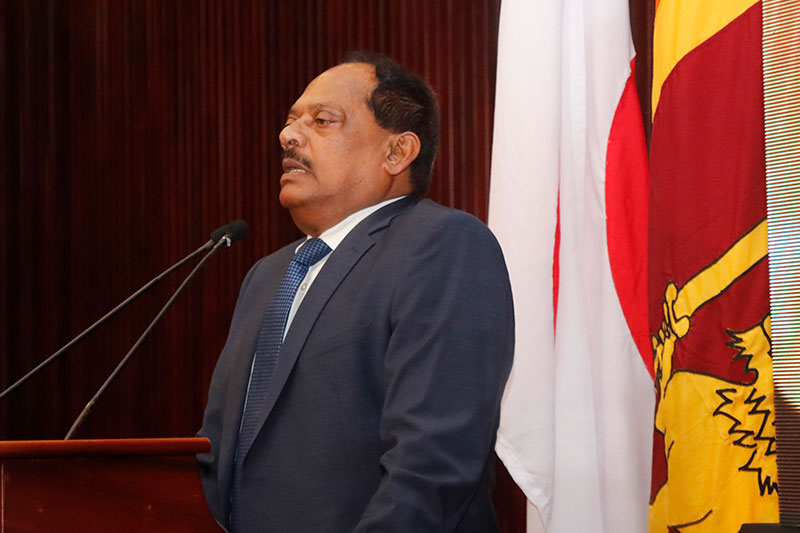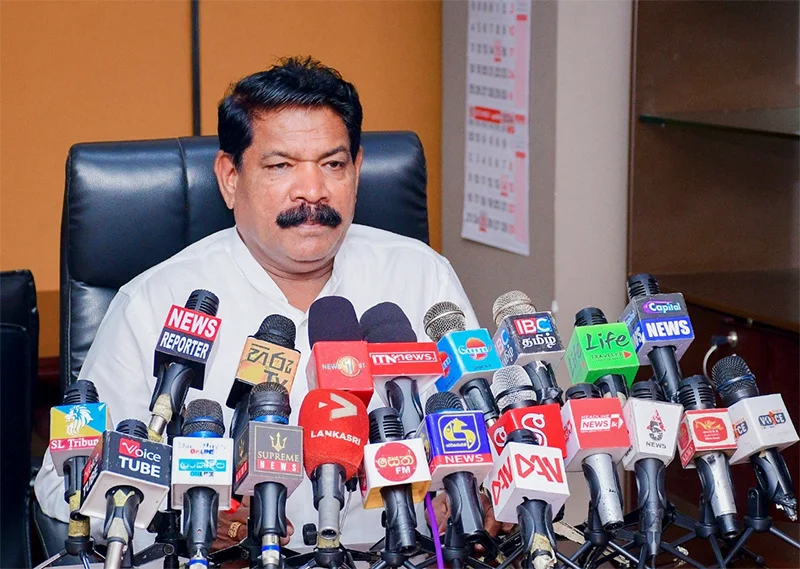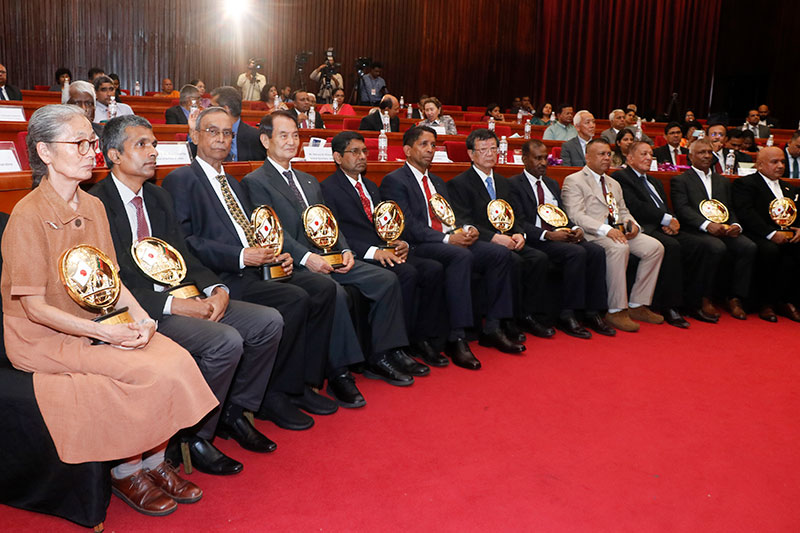News
Top academic calls for punitive measures against those abusing scholarships offered to govt.

JaGAAS lifetime awards 2025:
Vice Chancellor of the NSBM Green University, Prof. E. A. Weerasinghe, said that the government should take punitive measures against those chosen for foreign scholarships in case they violated bond conditions.
Tougher action was required to discourage public servants and academics from brazenly violating the trust placed on them, the top administrator said yesterday (23), in a brief interview with The Island after receiving Japanese Graduates’ Alumni Association of Sri Lanka (JaGAAS) lifetime awards 2025 at the BMICH on March 21. Prof. Weerasinghe received the award for exemplifying leadership and entrepreneurship in human capital development in higher education.
The other recipients were: Ms Baba Shigeko, Ito Yoshiaki, Koga Michio, Mikasa Jitsuo, Ogawa Kiyoko, Jagath Chandana Ramanayake, emeritus Prof. Yamada Yoshiaki, Prof. N.S. Cooray, Prof. Ranjith Dissanayake, retired IGP Chandra Fernando, Merrick Gooneratne, Dr. Nishantha Nanayakkara, Dr. OP.G. Rohan Pallewatta, Prof. Piyadasa Ratnayake, Ananda Shelton Thenuwara, Dayasiri Warnakulasooriya and Prof. E.A. Weerasinghe.
They received the coveted JaGAAS lifetime awards from Japanese Ambassador in Colombo Akio Isomata who, in his brief address, declared their dedication would inspire more people to pursue similar opportunities for study, collaboration and innovation.
Responding to The Island queries, Prof. Weerasinghe found fault with successive governments for failing to deal with wrongdoers. Alleging that academics were among the worst culprits, Prof. Weerasinghe said that along with him three others – a researcher with the National Dangerous Drugs Control Board and two University lecturers were chosen jointly by the governments of Japan and Sri Lanka. “We proceeded to Japan in 1990 and having obtained a doctorate in economics from Osaka City University I returned home in 1997. My colleagues decided against doing so. The researcher stayed in Japan while the remaining two migrated to Australia.”
Prof. Weerasinghe said that his former colleagues, now in Australia, once sought the opportunity to join the University. But they were told not to expect opportunities in the motherland after having betrayed the trust the country placed on them.
Prof. Weerasinghe said that though he could have easily migrated to New Zealand with his wife and two children, they decided to come back home. At the time Weerasinghe had received a Japanese scholarship he was serving the University of Sri Jayewardenapura as an assistant lecturer. “In terms of the bond conditions, I served the University for a period of seven years,” Prof. Weerasinghe said, adding that he never once regretted the decision to pursue a career here.
At the end of his sabbatical leave, Prof. Weerasinghe was offered the opportunity to serve as the Director General (DG) of the National Institute of Business Management (NIBM) in 2005. Prof. Weerasinghe emphasized that the NIBM had been in a much deteriorated state and restoration of the public faith in the Institution seemed a herculean task. “The University released me without pay,” a smiling Prof. Weerasinghe said, recalling his efforts to expand NIBM to other major towns, including Galle, Matara and Kandy, over the years.
The academic emphasised that in spite of the raging war in the Northern and Eastern regions and occasional terrorist attacks in the South the government sustained the NIBM. Sometime after the conclusion of the conflict in 2009, Prof. Weerasinghe, in his capacity as the DG, NIBM has proposed transforming the institute to a fully-fledged University. “Some were skeptical about my proposal. But, I pushed hard and finally managed to convince the powers that be that NIBM could be the foundation for a fully-fledged University,” Prof. Weerasinghe said.
Prof. Weerasinghe paid a glowing tribute to the Bank of Ceylon (BoC) for providing the wherewithal to launch the project in 2013. The BoC provided a staggering Rs 10 bn on a Treasury guarantee that made it possible for us to establish NSBM Green University in 2016, Prof. Weerasinghe said, declaring that his team ensured that the loan was paid on time. “There had never been an issue regarding the repayment of the loan and today we are a fully self-financed, state-of-the-art international-level University eyeing further expansion.’’
VC Weerasinghe said that recently they finalised a Rs 7.3 bn loan with the BoC in support of further expansion. Asked to explain the impact of the Covid-19 epidemic and the subsequent unprecedented economic crisis that compelled the government to declare bankruptcy in early 2022, Prof. Weerasinghe said that they received the maximum backing of the people who had faith in the University.
Emphasising the responsibility on the part of the government whoever is in power to ensure stability, Prof. Weerasinghe said that during the first phase of the project he had to work with 12 Ministers. The VC didn’t mince his words when he pointed out unnecessary difficulties caused by political appointments over the years. It would be easy to cause chaos, disrupt systems and undermine institutions that were managed without being a burden to the Treasury, Prof. Weerasinghe said. However, restoring public faith in such institutions would be extremely difficult, the Japanese scholar mentioned.
“NSBM Green University belongs to the government. Therefore, the University belongs to the people. Primary difference is we do not depend on government funds at all,” Prof. Weerasinghe said. According to him the University produced over 20,000 graduates and at the moment over 13,000 students were at five faculties, namely business, computing, engineering, science and postgraduate studies. “We have over 70 degree programmes to suit students,” Prof. Weerasinghe said, underscoring the pivotal importance of the government recognizing the contribution made by the University.
By Shamindra Ferdinando
News
Underworld leader threatens police over arrest of his father and brother

“You and your families will be eliminated”
By Norman Palihawadane and Hemantha Randun
A full-scale investigation has been launched to track down an underworld character, ‘Navy Dinesh,’ a key accomplice of Ganemulle Sanjeewa, for issuing death threats over the phone to three police officers, including the Gampaha HQI, Crime Branch OIC, of the same police station, and others.
Navy Dinesh is believed to have fled the country.
According to police sources, threats were issued following the arrest of Navy Dinesh’s father and brother in connection with a drug trafficking case.
Phone analysis reports have confirmed that the calls originated from Dubai and France.
Following the murder of Ganemulle Sanjeewa, Navy Dinesh assumed leadership of the underworld gang he had previously been involved with.
Navy Dinesh contacted the Gampaha HQI, the OIC of the Crime Branch, and the investigating police constable, and threatened to kill them and their family members. “You and your families will be eliminated,” he said.
A special police team had been assigned to investigate the matter, and a report has been submitted to the courts, police sources said.
News
Visit to Hamburg: PM Amarasuriya showcases positive investment climate

Prime Minister Dr. Harini Amarasuriya highlighted the significant potential for strengthening the economic ties between Sri Lanka and Germany. Premier Amarasuriya underscored the country’s improving economy, resurgent tourism and policy reforms that have fostered an attractive environment for investment and business.
Premier Amarasuriya said so at the annual gathering of the German Asia-Pacific Association (OAV) in Hamburg, Germany. She declared Germany is both a role model and an important partner in the further development of vocational education in Sri Lanka.
German Federal President Frank-Walter Steinmeier and Premier Amarasuriya attended the annual gathering of the German Asia-Pacific Association (OAV) as Guests of Honour.
Dr. Amarasuriya said: “For the first time in Sri Lanka’s history, the results of the Parliamentary elections held last year reflected a collective and unified voice from people of all regions of the country” and highlighted that the new government is committed to taking tangible steps in the interest of further advancing national unity and reconciliation. She also highlighted that the current Parliament, which was formed after the election, is one of the most inclusive in Sri Lanka’s history, with a record number of women and representatives of different communities.
During her visit to Hamburg, the Prime Minister held a bilateral meeting with Federal President Frank-Walter Steinmeier.
Premier Amarasuriya also attended the ‘German-Asian Forum on Vocational Education & Training’ organised by the OAV. In a keynote speech at this forum, she conveyed Sri Lanka’s appreciation to German government’s assistance to uplift the vocational education sector in Sri Lanka which date back to the establishment in 1959 of the Sri Lanka-German Technical Training Institute in Moratuwa, Sri Lanka, one of the milestones of the bilateral relationship. She stated that Sri Lanka aims to transform vocational education into a modern, relevant field that will help us create a skilled workforce that meets the demands of the industry, and which offer the youth of Sri Lanka real career paths, both in Sri Lanka and abroad.
She also took part in a Business Roundtable with over 20 member companies of OAV and visited German research and technology hubs in the city including ITECH, a vocational school for IT, electrical, and chemical engineering; NXP Semiconductors, a leading global semiconductors company; and DESY, Germany’s largest accelerator centre.
OAV is active in Sri Lanka through the BMO Membership Organisation Partnership Programme in Jaffna, which is a collaboration between the OAV and the Northern Chamber of Industries (NCI), and the Women’s Chamber of Industry and Commerce (WCIC) in Colombo. The programme aims to strengthen the competence and engagement of small and medium-sized enterprises in relation to public institutions and is supported by the German Federal Ministry for Economic Cooperation and Development (BMZ).
In a 20-minute address German Federal President Frank-Walter Steinmeier made a strong case for establishing future-oriented partnerships with countries in the Asia-Pacific region. According to Steinmeier, such action is urgently needed to reduce asymmetries and dependencies and mitigate the effects of increasing protectionism in world trade. To achieve this, it is important to better exploit the diverse opportunities in the dynamic region, Steinmeier said.
The remarks came during Steinmeier’s keynote speech during the traditional “East Asia friendship dinner” held in the ballroom of Hamburg City Hall. The event was hosted by the German Asia-Pacific Business Association (OAV), which is celebrating its 125th anniversary this year.
“Recently, we have been forced to witness how close friends and allies are turning away from the order they played such a crucial role in establishing, and are celebrating wilfulness as progress,” Steinmeier noted. “The 102nd East Asia friendship dinner and 125 years of the German Asia-Pacific Business Association stand for something that might seem old-fashioned at first glance in our time but is all the more important in a time of crisis: partnership.”
Within this partnership framework, Steinmeier highlighted the vast opportunities the Asian market presents for Germany. “We will continue to diversify our foreign trade, reduce our economic and security policy dependencies, and forge closer political contacts with a larger number of countries, including in the area of trade policy,” Steinmeier said.
News
Indo-Lanka govt. level talks soon on fishing row: Fisheries Minister

Days ahead of Indian Prime Minister Narendra Modi’s visit to Lanka, Minister of Fisheries, Aquatic and Ocean Resources, Ramalingam Chandrasekar has said that goverment level talks on the fishing dispute between Sri Lanka and India would be held soon in the presence of fishermen, Times of India said yesterday (31).
Minister Chandrasekar issued the statement on Sunday after a delegation of fishermen from Rameswaram held a meeting with him in Jaffna on Saturday evening.
The delegation, led by fishermen’s leader R Sahayam, appealed to the Minister to initiate talks between fishermen of the two countries. The last ministerial level talks on the dispute were held in 2016. Calling for a lasting solution to the problem, the delegation pleaded with the Minister to secure the release of Indian fishermen and their fishing craft held in the island nation’s custody.
Prime Minister Narendra Modi is slated to visit Sri Lanka on April 4, and the fishermen’s row is likely to be one of the issues that will figure in his meeting with his Sri Lankan counterpart.
Meanwhile, the delegation from Rameswaram met fishermen lodged in Sri Lankan prisons, and took stock of the fishing craft confiscated by the authorities on charges of poaching in Sri Lanka’s territorial waters.
The fishermen’s leaders had met their counterparts at Vavuniya on March 26 and discussed the issue. The Indian side sought time to bring trawling to a halt, but the Sri Lankan fishermen made it clear that trawling won’t be accepted in their waters, though they are ready for an amicable solution.
Reiterating this stand, leaders of the Northern Province Fisher People Unity, an umbrella forum of fishermen associations of the northern provinces of Sri Lanka, told reporters on Sunday that Indian trawlers should stop coming to Sri Lankan waters.
Else, their country’s law should find its course to stop it. They are determined that their people should fish in their waters independently and leave the marine resources for future generations, said forum spokesperson Annarasa Annalingam.
-

 Sports2 days ago
Sports2 days agoSri Lanka’s eternal search for the elusive all-rounder
-

 Features6 days ago
Features6 days agoCelebrating 25 Years of Excellence: The Silver Jubilee of SLIIT – PART I
-

 Business6 days ago
Business6 days agoCEB calls for proposals to develop two 50MW wind farm facilities in Mullikulam
-

 Business4 days ago
Business4 days agoAIA Higher Education Scholarships Programme celebrating 30-year journey
-

 News3 days ago
News3 days agoGnanasara Thera urged to reveal masterminds behind Easter Sunday terror attacks
-

 Features6 days ago
Features6 days agoNotes from AKD’s Textbook
-

 News2 days ago
News2 days agoComBank crowned Global Finance Best SME Bank in Sri Lanka for 3rd successive year
-

 Features2 days ago
Features2 days agoSanctions by The Unpunished












